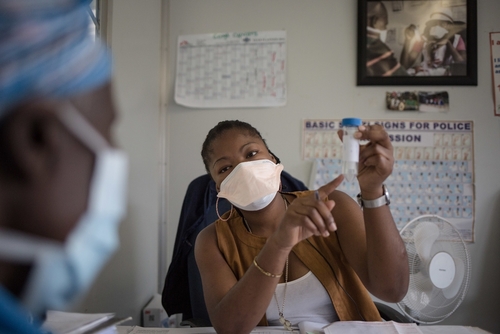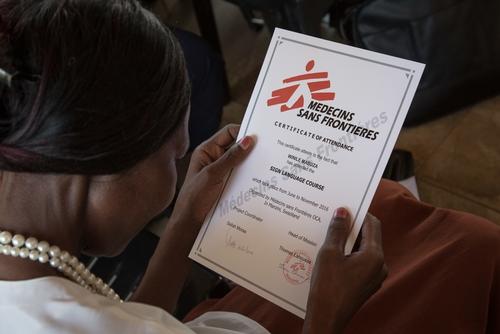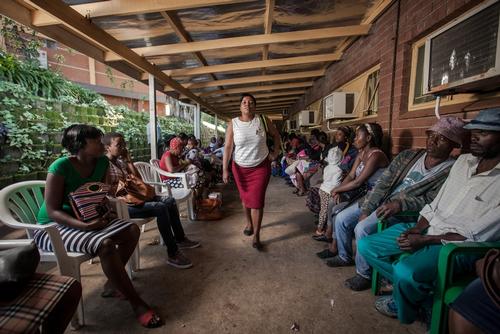Manzini, 25 June 2018 - Eight years after the medical humanitarian organisation Médecins Sans Frontières (MSF) opened an emergency intervention in Swaziland’s Manzini region to help the Ministry of Health manage a dual HIV/AIDS and tuberculosis (TB) epidemic, as a mark of its success, the project is being handed over to national service providers.
“As the original objectives of the project have been achieved, with the number of new HIV and TB infections going down significantly, MSF is scaling down its medical activities in Swaziland and will be handing over the Manzini project to the Ministry of Health at the end of June 2018,” said Audrey van der Schoot, MSF head of mission in Manzini.
“While the need for high-quality TB and HIV care remains, great gains have been made in the fight against HIV/AIDS and TB in Swaziland. This includes positive developments in the testing and treatment of HIV and TB, including decentralised care, HIV ‘test and treat’ [providing immediate treatment at the time of HIV diagnosis], new diagnostics for TB, and the introduction of shorter treatment regimens and new medicines for drug-resistant TB.”
Since 2010, the number of new HIV infections (incidence rate) among adults in Swaziland has decreased from 2.5 to 1.4 per cent, while the number of people infected with HIV (prevalence rate) has decreased from 32 to 30 per cent. Swaziland has been doing very well in achieving the UNAIDS’ 90-90-90 goals for HIV, with 85 per cent of people living with HIV knowing their status, 88 per cent of people living with HIV on antiretroviral treatment (ART), and 92 per cent of people on ART having no detectable virus in their blood (‘viral suppression’).[1]
In terms of TB, the overall incidence rate decreased from 1,320 cases per 100,000 people in 2010, to 388 cases per 100,000 people in 2017 – a reduction of around 71 per cent. Meanwhile, the incidence rate of multidrug-resistant TB has dropped from 7 per cent in 2010 to 3 per cent in 2017. In 2013 there were 566 new drug-resistant cases, compared with 318 in 2017, indicating a 44 per cent decrease.
“The handover of these projects does not spell the end for MSF in Swaziland. The MSF Manzini programme in the Mankayane sub-region and Manzini region will be managed by the Ministry of Health, while the Matsapha Comprehensive Clinic has been handed over to the AIDS Healthcare Foundation (AHF), so patients will continue to receive care. MSF will continue its activities in Shiselweni, assisting patients and the Ministry of Health,” said Serge Kabore, MSF head of mission in Shiselweni.
MILESTONES
Between 2009, when MSF first conducted an assessment in Manzini region, and the end of 2017, MSF has invested 25.6 million euros in medical operations. This includes infrastructure projects such as the set-up and construction of Matsapha Comprehensive Clinic, rehabilitation of the National TB Reference Laboratory, rehabilitation of the Mankayane Hospital TB ward, construction and rehabilitation of the Mankayane (drug-resistant) TB and HIV outpatient department, construction of Mpuluzi, Mahlangatsha, Musi and Luyengo health facilities in Mankayane sub-region, and construction and rehabilitation in the National TB Hospital outpatient department.
Between 2011 and 2017, 78,500 people were tested for HIV and 7,303 newly diagnosed patients were initiated on ART. A total of 5,238 patients were treated for drug-sensitive TB, with an 80 per cent success rate, and 862 patients were treated for drug-resistant TB, of which 258 were initiated on new medicines. All HIV and TB services were integrated with primary health services such as antenatal and outpatient care.
A shorter regimen to treat multidrug-resistant TB (MDR-TB) was introduced by MSF in 2014, shortening the conventional 20-month regimen to only nine months. This regimen has shown a 75 per cent success rate. It is easier for patients to follow and enables them to more quickly resume social activities and work. This shorter regimen has since been recommended by the World Health Organization and was adopted by the Ministry of Health as the new national standard of care for MDR-TB treatment in Swaziland from 2017, with MSF providing support.
New drugs for treating MDR-TB and extensively drug-resistant TB (XDR-TB) were introduced in 2015 by the National TB Control Program in Swaziland, with the support of MSF. It has taken more than 50 years to develop the new medicines bedaquiline and delamanid, which have proven to be very effective in treating MDR-TB and XDR-TB. Since 2015, 287 DR-TB patients in Swaziland have been treated with these new medicines, with excellent results.
[1] UNAIDS’ 90-90-90 goal aims to ensure that by 2020, 90 percent of all people living with HIV know their status; 90 percent of people living with HIV have begun antiretroviral treatment; and 90 percent of people on treatment have no detectable virus in their blood (‘viral suppression’).





